Moscow concert hall attack: Why is ISIL targeting Russia?
Deadly attack in Moscow claimed by ISIL affiliate leaves more than 133 people dead and approximately 100 injured.
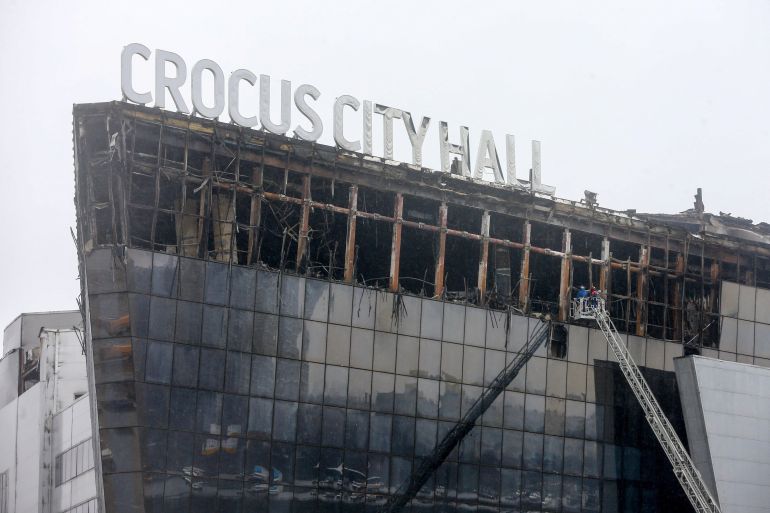
More than 133 people have been killed and more than 100 others were injured following a brazen attack on concertgoers at Moscow’s Crocus City Hall before a performance by a Soviet-era rock band on Friday.
Assailants dressed in camouflage uniforms opened fire and reportedly threw explosive devices inside the concert venue, which was left in flames with its roof collapsing after the deadly attack.
Keep reading
list of 4 itemsMore than 130 killed in Moscow concert hall attack
‘Heinous, cowardly’: World reacts to attack on Moscow concert hall
Moscow concert hall attack: What do we know so far?
Eleven people had been detained, including four people directly involved in the armed assault, Russia’s Interfax news agency reported on Saturday.
ISIL’s Afghan branch – also known as the Islamic State in Khorasan Province, ISKP (ISIS-K) – has claimed responsibility for the attack and United States officials have confirmed the authenticity of that claim, according to the Reuters news agency.
Here is what we know about the group and their possible motive for the Moscow attack.
ISIL’s Afghanistan branch
The group remains one of the most active affiliates of ISIL and takes its title from an ancient caliphate in the region that once encompassed areas of Afghanistan, Iran, Pakistan and Turkmenistan.
The group emerged from eastern Afghanistan in late 2014 and was made up of breakaway fighters of the Pakistan Taliban and local fighters who pledged allegiance to the late ISIL leader, Abu Bakr al-Baghdadi.
The group has since established a fearsome reputation for acts of brutality.
Murat Aslan, a military analyst and former Turkish army colonel, said ISIL’s Afghanistan affiliate is known for its “radical and tough methodologies”.
“I think their ideology inspires them in terms of selecting targets. First of all, Russia is in Syria and fighting against Daesh [ISIL] like the United States. That means they see such countries as hostile,” Aslan told Al Jazeera.
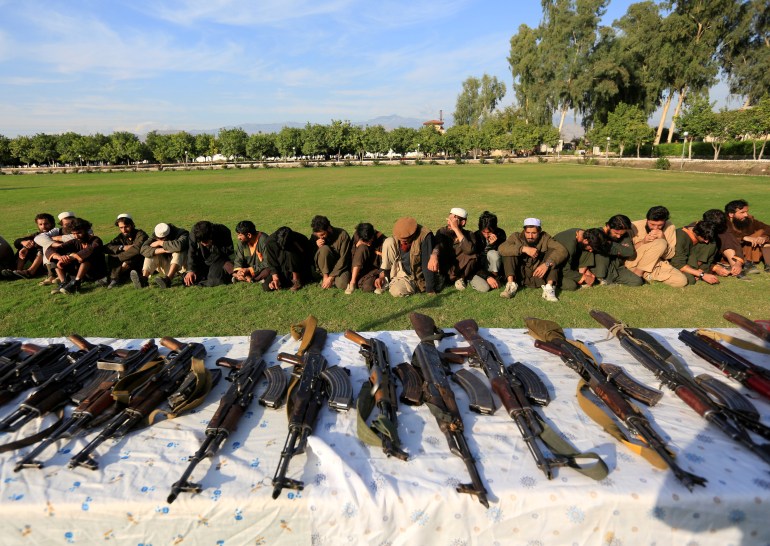
“They are now in Moscow. Previously they were in Iran, and we will see much more attacks, maybe in other capitals,” he added.
Though its membership in Afghanistan is said to have declined since a peak in about 2018, its fighters still pose one of the greatest threats to the Taliban’s authority in Afghanistan.
Previous attacks by the group
ISKP fighters claimed responsibility for the 2021 attacks outside Kabul airport that left at least 175 civilians dead, killed 13 US soldiers, and many dozens injured.
The ISIL affiliate was previously blamed for carrying out a bloody attack on a maternity ward in Kabul in May 2020 that killed 24 people, including women and infants. In November that same year, the group carried out an attack on Kabul University, killing at least 22 teachers and students.
In September 2022, the group took responsibility for a deadly suicide bombing at the Russian embassy in Kabul.
Last year, Iran blamed the group for two separate attacks on a major shrine in southern Shiraz – the Shah Cheragh – which killed at least 14 people and injured more than 40.
The US claimed that it intercepted communications confirming that the group was preparing to carry out attacks before coordinated suicide bombings in Iran in January this year killed nearly 100 people in the southeastern Iranian city of Kerman. ISKP claimed responsibility for the Kerman attacks.
Why is ISIL attacking Russia?
Defence and security analysts say the group has targeted its propaganda at Russian President Vladimir Putin in recent years over the alleged oppression of Muslims by Russia.
“Russian foreign policy has been one big red flag for ISIS [ISIL],” Michael Kugelman, director of the South Asia Institute at the Washington-based Wilson Center told Al Jazeera. “The Soviet invasion of Afghanistan, Russian actions in Chechnya, Moscow’s close relationships with the Syrian and Iranian governments, and especially the military campaigns that Russia has waged against ISIS fighters in Syria and — through Wagner Group mercenaries – in parts of Africa.”
All of that has meant that Moscow has become a focus of ISKP’s “extensive propaganda war,” said Amira Jadoon, assistant professor at Clemson University in South Carolina and co-author of, The Islamic State in Afghanistan and Pakistan: Strategic Alliances and Rivalries.
“Russia’s engagement in the global fight against ISIS and its affiliates, especially through its military operations in Syria and its efforts to establish connections with the Afghan Taliban – ISIS-K’s rival – marks Russia as a key adversary for ISIS/ISIS-K,” Jadoon told Al Jazeera.
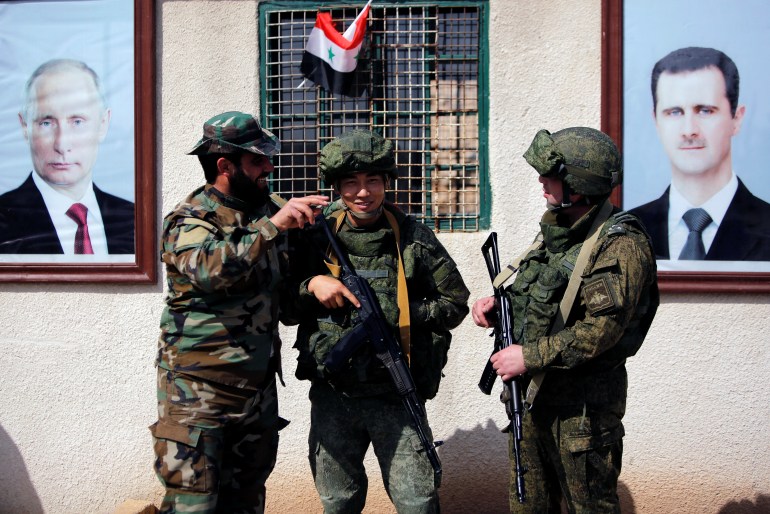
Should the Moscow attack be “definitely attributed” to ISKP, Jadoon said, the group hopes to win support and advance “its goal to evolve into a terrorist organisation with global influence” by demonstrating that it can launch attacks within Russian territory.
“ISK [ISKP] has consistently demonstrated its ambition to evolve into a formidable regional entity … By directing its aggression towards nations such as Iran and Russia, ISK not only confronts regional heavyweights but also underscores its political relevance and operational reach on the global stage,” Jadoon said.
Kabir Taneja, a fellow at the Strategic Studies Programme of the Observer Research Foundation – a think tank based in New Delhi, India – told Al Jazeera that Russia is seen by ISIL and its affiliates as “a crusading power against Muslims”.
“Russia has been a target for ISIS and not just ISKP from the beginning,” Taneja, author of the book, The ISIS Peril, said.
“ISKP attacked [the] Russian embassy in Kabul in 2022, and over the months, Russian security agencies have upped their efforts to clamp down on pro-ISIS ecosystems both in Russia and around its borders, specifically Central Asia and the Caucusus,” he said.
In early March, Russia’s Federal Security Service, better known as the FSB, said it had thwarted an ISIL plan to attack a Moscow synagogue.
“The most compelling current motivation for ISIS-K to attack Russia is the Taliban factor. The Taliban is a bitter rival of ISIS, and ISIS views Russia as a friend of the Taliban,” said Kugelman.
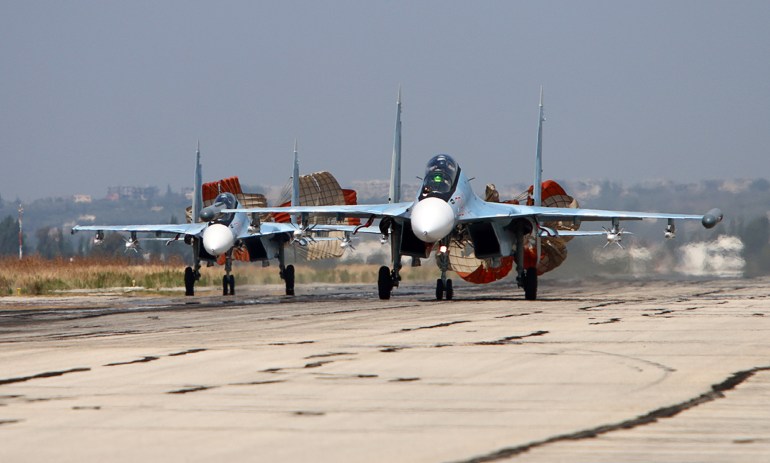
Moscow’s close relations with Israel are also anathema to ISIL’s ideology, Taneja said.
“So this friction is not new ideologically, but is so tactically,” he told Al Jazeera.
There’s another factor, too: Largely away from the world’s attention, the armed group has regrouped into a formidable force after setbacks in Syria and Iran.
“ISKP in Afghanistan has grown in strength significantly … and it’s not just ISKP, ISIS in its original regions of operations, Syria and Iraq, also sees [an] uptick in operational capabilities,” Taneja said. Today, he added, it is “ideologically powerful even if not politically, tactically or strategically … that powerful any more”.
That poses a challenge for a distracted world, he said.
“How to combat this is the big question at a time when big power competition and global geopolitical churn has put counterterrorism on the back burner,” Taneja added.
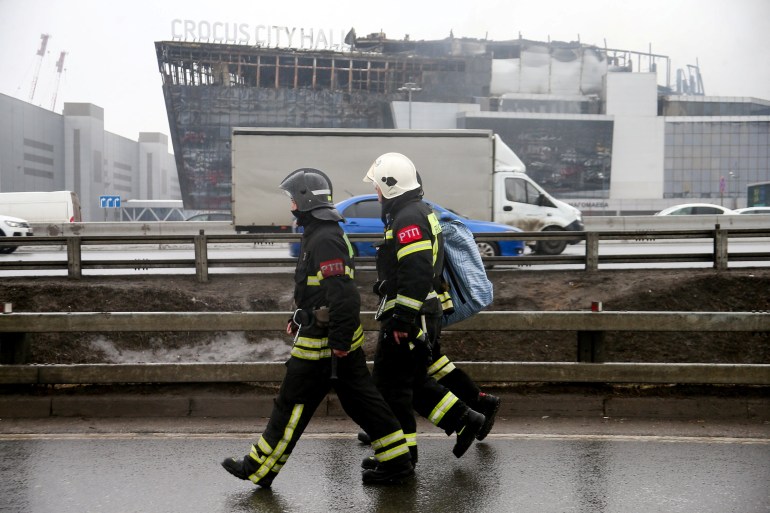
How has ISIL responded?
ISKP social media channels are “jubilant” following the attack on Moscow, said Abdul Basit, a senior associate fellow at the S Rajaratnam School of International Studies, Singapore.
“They are celebrating the attack,” Basit told Al Jazeera, adding that supporters are “translating and recirculating the responsibility claim” issued by the ISIL-linked Amaq News Agency.
Basit said that ISIL’s method of operations involves amplifying a propaganda campaign in advance of large-scale attacks and this had been observed in recent anti-Russian messaging. Such attacks “add to the credibility” of armed groups, Basit explained, which then “increases the scope of their funding, recruitment and propaganda”.
More attacks are possible in Russia and elsewhere, he added, given the key role that ISIL recruits of Central Asian origin – particularly Tajiks – played when the group held territory in Syria. They have now returned to the Central Asia region and their intent to carry out attacks has now materialised in capability, Basit said.
Previous attacks in Russia
Moscow and other Russian cities have been the targets of previous attacks.
In 2002, Chechen fighters took more than 900 people hostage in a Moscow theatre, the Dubrovka, demanding the withdrawal of Russian troops from Chechnya and an end to Russia’s war on the region.
Russian special forces attacked the theatre to end the standoff and 130 people were killed, most suffocated by a gas used by security forces to leave the Chechen fighters unconscious.
The deadliest attack in Russia was the 2004 Beslan school siege which was carried out by members of a Chechen armed group seeking Chechnya’s independence from Russia. The siege killed 334 people, including 186 children.